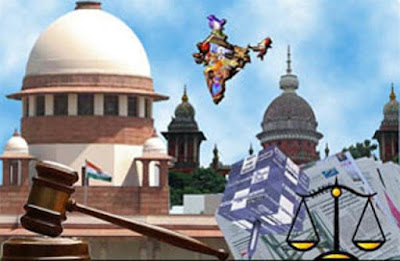Indian Registration Act 1908 has mandated that who should present the document for registration personally. The executant of a document or any person claiming under such document or representative or assignee of such executant or duly authorised power of attorney holder has to present the document for registration. These are detailed in sections 32 and 33 of the Act. Karnataka Registration Rules stipulates the document shall be presented for registration to the registering officer and not to a clerk or peon. In the ordinary course, the registration or deposit of documents has to be made only at the designated office.
Section 31 of the Act gives power to the registering officer under special circumstances to attend the residence of any person desiring to present a document for registration or to deposit a will and accept for registration of such document or deposit of will.
Section 38 of the Act lists the category of persons who are exempted from appearance at registration office to present the document for registration.
1) Any person who is bodily infirm because of illness or age and cannot attend the office without the risk or inconvenience,
2) any person in jail under civil or criminal process or
3) persons who are exempt by law from personal appearance in court are exempted from personal appearance or through their agents.
Persons who are exempted from personal appear-ance in court as per Civil Procedure Code are (1) Women who according to the customs and manner of the country ought not to be compelled to appear in public; persons of rank specially exempted by the government. In such cases the registering officer shall personally go to the house of such person or the jail where the person is confined and examine him or may appoint a person to visit and examine such person.
Karnataka Registration Rules 1965 has formulated procedure for attendance of the registering officer at Private residence. The relevant rules are detailed in chapter 10 and under Rule Nos. 56 to 32. Any application for attendance at private residence shall be in writing and has to be signed by the person who requests the attendance at his residence. Such letter may be presented by any person to the registering officer. The request has to be complied with as early as possible. If such attendance at private residence disturbs the regular routine of the office or requires closure of office and if the case does not fall under section 31 of the Indian Registration Act, a commission may be issued, which means another person other than the registering officer may be requested to attend the private residence and complete the registration formalities. The attendance of sub-registrar at private residence or issuing commission has to be reported to the registrar within 24 hours. The Sub-registrar shall not proceed out of his sub district for this purpose, but registrar may attend the private residence situated in his district though it may not be situated within the sub district under his immediate charge.
The commissioner appointed to attend the private residence will examine the witness and persons to give evidence and the registering officer will examine the commissioner personally in his office connected with discharge of his commission and voluntary nature of admission of execution.
During the course of attendance if the registering authority has to record the admission or execution of persons not exempted from personal appearance in respect of the same document executed by a person exempted from personal appearance, the registering authority may comply with the request provided attendance fee is levied.
Section 88 of the Act refers to documents, which are executed by government officers or certain public functionaries who are exempted from personal appearance.
Any officer of the government, any administrator general, official trustee or official assignee, the sheriff, receiver or registrar of High Court, any holder of such other public office as is notified in the official Gazette of the state government are exempt from personal appearance or through their agents in connection with registration of any instrument executed by them or any document executed in their favour in their official capacity. They are also exempted from signing the document for admitting the execution as required under section 58 of the Act.
When documents are forwarded by government officer with a covering letter stating that documents executed by him be registered, the covering letter will be sufficient to satisfy the genuineness of the signature of the executant. If such document is presented by a private party, who is also a party to the document, the registering authority will satisfy as to the genuineness of the signature by a brief enquiry. The fact of exemption from personal appearance and presentation of the document by covering letter will be endorsed.
Certain category of documents like copies of orders, certificates and instruments need not be presented for registration but may be sent to the registering office for filing as per section 89 of the Act. In the following cases, copies have to be forwarded to the Jurisdictional registering officer under whose jurisdiction the immov¬able property in question is situated:
(A) Every officer granting a loan under Land Improvement Loans Act 1883. Every court granting a certificate of sale of immovable property under Civil Procedure Code, 1908.
(B )In case of loans under Land Improvement Loans Act 1883, details of the land to be granted as collateral security.
(C) Every officer granting loan under Agriculturists Loan Act 1884 has to forward, a copy of the document whereby the immovable property is mortgaged to secure repayment of the loan and a copy of such order.
(D) Every Revenue officer, who grants a certificate of sale to the purchase of immovable property sold in public auction.
The registering officer will file the copies of such orders, certificates, and instruments in book No. 1. The concerned officers need not appear in person at registration office.
State government has made rules as to the mode of making copies and manner of filing copies.
List of Persons exempted from Personal appearance for registration as per section 88(1) of the Registration Act, 1908 and other connected Acts:
1. Any officer of the Government.
2. Any Administrator General, Official trustee or official Assignee.
3. The Shariff, Receiver or Registrar of High Court.
4. The holder for the being of such other public office as may be specified in a Notification in the official Gazette issued on that behalf by the state Govt.
5. As per section 39 of Karnataka State Co-operative Societies Act, 1959, any member of the Committee, Secretary or other officer of Co-operative Department or Society.
6. Managing Director and Vice Chairman of the Mysore Iron and Steel Limited Bhadravathi (No. RD 9 ERG 65 Dt 24.03.1965)
7. Comptroller of University of Agricultural Sciences, Bangalore (No. RD 41 EST 72 dt. 28.09.1974)
8. Executive Officer, TTD Tirupathi is an officer of the Govt. Hence he is exempted from personal appearance under section 88(1) (a). Clarification issued by Inspector General of Registration and Commissioner of stamps (No.RGN/104/73/74 dt. 25.06.1974.)
9. The Regional Provident Fund Commissioner of Karnataka (No.RD 204 EST 78 dated 19th Jan. 1979).
10. Managing Director, Karnataka Scheduled caste and Scheduled Tribes Development Corporation, Bangalore (No.RD 137 EST 79 dt. 19.03.1979)
11. The Chairman or Secretary, City Improvement Trust Board, Mysore and all Executive Engineers (Electrical) of all Divisions of KEB, Bangalore (No. RD 204 EST 78 dated 19th Jan. 1979)
12. The Chairman, Improvement Trust Board, Davangere (NO. 129 RD 115 EST 79 dated 19.06.1979)
13. Divisional Manger, LIC of India.
14. Chairman, New Mangalore Port Trust, Panambur (No. RD 115 EST 80 dt. 14-7-80)
15. Manager of Nationalised Banks as the holder of public offices (No. RD 50, EST 80 dt. 11.8.82).
16. Chairman and /or Managing Director, Karnataka Agro Industries Corporation Limited, Hebbal, Bangalore (No. RD 69 EST 82 dt.4-9-82).
17. Chairman of all the Improvement Trust Boards constituted in the state (No. RD 69 EST 82 dt.4-9-82).
18. Managing Director, Karnataka Power Corporation, Bangalore (No. RD 260 EST 80 dt.4-9-82).
19. Registrar of Indian Institute of Science, Bangalore (No. RD 113 ESR 82 dt. 23.6.84)
20. District Managers, Food Corporation of India (No. RD 171, EST 80 dt. 21.6.1985).
21. Chief Administrative Officer, National Institute of Mental Health and Neuro Science, Bangalore (No. RD 271, ESR 86 dt 17.12.86)
22. Presidents of all the Municipality and Town Municipalities in the state of Karnataka for the purpose of the said sub-section. (No. RD 271 ESR 85 Dt. 13-10-1986).
23. Administrative Officer, Regional College of Education, Mysore in connection with the execution of registration of Mortgage Deeds by the employees of Regional college of Education, Mysore while drawing advances like house building, advances etc. (No.RD 104 ESR 87 dt. 8-12-1987).
24. Managers of the Regional Rural Banks (No.RD 42 MUNOSA 95 dated 18.7.1995).
25. Following Officers of the K.I.A.D.B. as the holders of public offices for the purpose of the said Section:
i) Secretary
ii) Law Officer
iii) All the Assistant Secretaries
iv) All the Deputy Development Officers (No. RD 357 MUNOMU 95 dated 24-8-1995).
For More Information:




